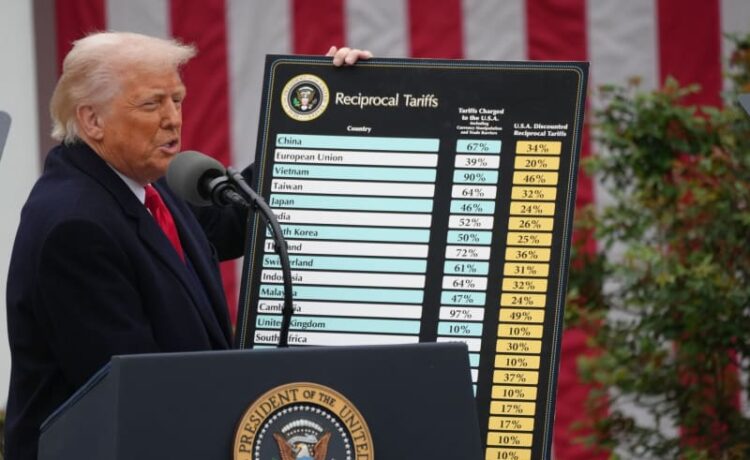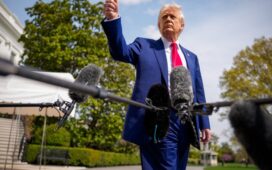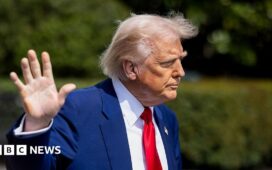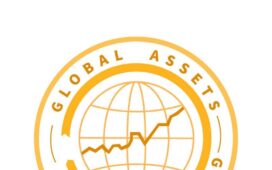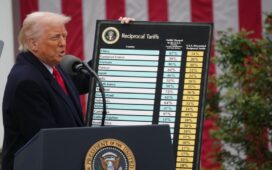US trading partners and companies reacted to Donald Trump’s new sweeping global tariffs with disappointment on Thursday, while at the same time starting to develop strategies to counteract the US president’s move.
The European Union and China immediately announced countermeasures but are also seeking dialogue. Others, such as India, opted for a wait-and-see approach.
The US government is introducing new universal tariffs of a minimum of 10% on imports from all countries, with significantly higher punitive tariffs applying for some, depending on trade deficits.
Imports from Germany and other EU countries to the United States will face new tariffs of 20%.
“THE OPERATION IS OVER! THE PATIENT LIVED, AND IS HEALING,” Trump wrote on his social media platform Truth Social, the day after his landmark announcement.
Swift Canadian reaction
Canada is responding to Trump’s trade war by imposing countertariffs on certain vehicle imports from the US.
Ottawa will impose a 25% import fee on all cars not produced under the North American Trade Pact USMCA, Canadian Prime Minister Mark Carney announced.
Carney emphasised that the United States is no longer a friendly partner to Canada and that the country will defend its interests and sovereignty.
Carney spoke with acting German Chancellor Olaf Scholz and announced: “We agreed to strengthen the diverse trade relationship between Canada and Germany.
“As we face the crisis caused by President Trump’s tariffs, reliable trade partners are more important than ever.”
Mexican workaround
Mexico said it is looking for ways to minimize the impact on carmakers in the Latin American country.
According to President Claudia Sheinbaum, German car firms Volkswagen, BMW and Mercedes-Benz are prepared to adjust their production to comply with rules of origin as part of the USMCA.
Mexico wants to continue negotiating with Washington on preferential treatment for car imports under the agreement.
According to the Wall Street Journal, Volkswagen has temporarily halted deliveries of vehicles from Mexico to the US and is holding back imports from Europe in ports for the time being.
Ferrari became the first manufacturer to raise prices in the United States, by up to 10%, in line with its previously announced intention.
Fellow automaker Stellantis is interrupting production in Canada. The plant in the province of Ontario will be closed for 14 days starting next week, the union Unifor reported on Facebook.
Television networks ABC and CNBC reported that the same applies to the Toluca plant in Mexico.
Toughest US tariffs yet
This is the most aggressive step yet in Trump’s already combative trade policy. Economists have said that US consumers will experience significant price increases, but consumers in Europe and other parts of the world will also feel the pinch.
Stock prices fell in New York, Tokyo and Frankfurt, with the price of gold reaching a record high and the euro gaining further on the dollar.
European Commission President Ursula von der Leyen said the universal tariffs represent a severe blow to the global economy, with immense consequences expected.
European negotiators had tried to prevent the new tariffs during talks in Washington but were unsuccessful.
French President Emmanuel Macron also expressed concern that Trump’s tariffs will significantly impact the European economy.
Macron denounced what he termed “a brutal and unfounded decision” by Trump.
US seeks European shift
US Commerce Secretary Howard Lutnick urged countries to rethink their trade policies after Trump’s announcement.
“I expect most countries to start to really examine their trade policy towards the United States of America, and stop picking on us,” he said in an interview with US news channel CNBC.
Lutnick did not say whether the United States would reduce its tariffs in return.
“We’re talking with all of the major countries of the world, and we’ve been talking to them for more than a month,” Lutnick said, stressing that the tariff package had been foreseeable.
The key question, he said, is whether other countries will treat the US fairly in the future.
“And the answer is, over time, that is going to be yes,” Lutnick asserted.
Trump has often complained that the EU is “ripping us off” and has expressed his frustration that European companies sell significantly more goods in the US than American companies sell in the EU.
Washington argues that it is merely raising tariffs wherever international partners impose duties or other trade barriers on US companies. This, they claim, is only fair.
But how the US is calculating this so-called unfairness remains opaque, making the “fairness” of the move difficult to assess, Rolf Langhammer, an economist at the Kiel Institute for the World Economy, told dpa.
“We don’t know how US President Donald Trump arrived at these figures,” he said. “We are still in the dark.”
Trump is likely attempting to factor in so-called non-tariff trade barriers, Langhammer theorized. The economist cited hormone-treated beef, which cannot be legally imported into the EU from the US. Trump simply attaches a price tag to such restrictions, Langhammer explained.
Unequal tariffs on Ukraine, Russia
Russia, which launched a full-scale invasion of Ukraine more than three years ago, was not included because US sanctions already “exclude any significant trade,” Trump spokeswoman Karoline Leavitt said.
Ukraine, on the other hand, was slapped with punitive tariffs of 10%.
In reality, however, the US still imports more goods from Russia than from Ukraine.

